| Organe de presse | ||||
| HOME | ||||
| Change
language |
|
|||||||||
| Droit Fondamental | |||||||||
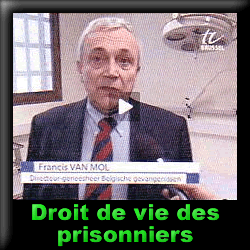 Political
and economical priority on health care in prison
Political
and economical priority on health care in prison
Head doctor of the Belgian prisons, the opinion of Dr. Francis Van Mol prevails over that of his fellow-members, as for the possibility of a prisoner to survive in prison. It is him, the clairvoyant employed by the ministry of justice, who makes remote diagnosis of patients he has never seen and oppose to the hospitalizations prescribed by their attending physicians. He crunches an average of one dead per week, of which 36% of suicides, to believe the statistics of his ministry. He is the thirteenth doctors who looked at Marcel Vervloesem's medical dossier, but the only one who claims that he is in state to be treated properly in prison.
NGO director, Marcel Vervloesem denounces the imagery industry of crime against the children since 1988. Jo Vandeurzen, ex Minister for justice, lied knowingly to the Senate to justify his imprisonment. He is thus became a political prisoner. No doctor can claim to be unaware of he is imprisoned for crimes medically impossible to carry out in his health condition. He has all the terminal illness which justifies his release before the European Court of Human Rights demands it. Strasbourg had to multiply the requests to the ministry for justice, employer of Dr. Van Mol, to obtain the documents still absent from the file.
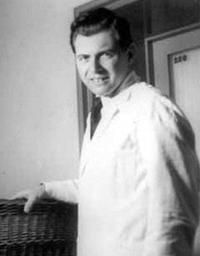 |
| Dr Mengele [1911 1979]. Head doctor at Auschwitz-Birkenau. The prisoners who survived his scientific experiments were almost always executed for dissection. He was made prisoner of war and retained close to Nuremberg. The allies did not identify him because he didn’t have the distinctive S.S. tattoos. They released him and he lived free 35 years. He died in Brazil in 1979 of a heart attack, drowned as he was swimming in a paradisiacal sea. |
Nobody thought that Marcel would survive so many delaying tactics. He was imposed 32 days of isolation. He was deprived of fresh water during 21 days. He was deprived of health care until six emergency surgeries in ten days were necessary to save his life. He was left in such a state, that gangrene requested to chop him off flesh and bone, which marks him of a hole in where he will be able to hide half of his fist until the end of his days. He was shacked 24 hours a day in the hospital. Prison wardens would dress in nurse blouses, to watch him naked, shackled to a surgery table. They imposed him their presence and electric light, even during the night, so as to ensure he could not rest.
Dr. Van Mol does not explain that nine of his fellow-members would have been mistaken to oppose to this imprisonment. He has the originality - for a doctor - to bring forward legal arguments, rather than medical ones. Belgium has indeed legalized the majority of the professional misconducts of the doctors, by a jurisprudence which discharges them, in so far as the damage can be allotted to another cause. He thus claims that Marcel would have ended-up a foot in the grave, due to his own fault, because he would be smoker, whereas smoke disturbs him so much that at home, he asks his guests to smoke in the garage.
The doctors of the prison told him they believe on the contrary that the dramatic degradation of his health is due to the delaying tactics to defer the care which they had prescribed. His kidneys had appeared deteriorated at the time of a hospitalization 2005. His diabetes had led to a critical condition before the imprisonment, according to them. They made all the examinations and the prescriptions required, but would have taken with by surprise, by a lack of authorization.
The medical centre of the Bruges prison would be "a complete small hospital", according to the ministry of justice. The respect for the sick prisoners, only ensure them a smoking-room/library for social contacts. It could thus have unique statistics, on the risk of internal bleeding and gangrene to passive smokers.
At the time of Jo Vandeurzen, no court would have denied Dr. Van Mol that a non smoker must assert isolation in prison, to preserve his health. Since, this minister resigned, after being exposed to have influenced the Fortis lawsuit. No one knows what his successor holds for justice.
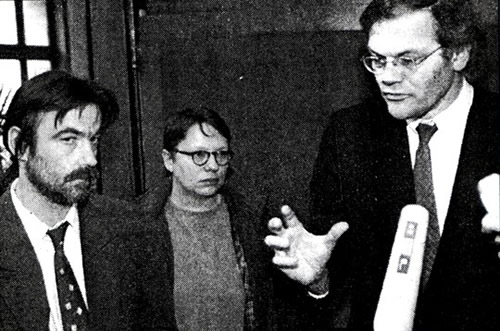 |
| 1998 - Stefaan De Clerk, with the mother and the father-in-law of Manuel Schadwald, missing from Berlin at the age 11 years in 1993. Marcel Vervloesem had found his photograph in the Temse/Madeira file. Robbie Vander Plancken, former victim, prostitute at the 12 years age, wanted to get rid of Ulrich, who blackmailed him. He leads Marcel Vervloesem to Zandvoort, where Manuel appeared among the photographs of 90.000 children, victims of the industry of the image of crime. 10 YEARS LATER: Rainer Wolf, father-in-law of Manuel (above on the left), has a sadomasochistic club in Berlin. Marcel, who never stopped looking for Manual, is in prison, shown as the " only criminal" of the network. |
Indeed, in 1997, Stefaan Declerck, the new Minister for Justice, had referred to the work of Marcel Vervloesem and his ONG with a lot of admiration. He resigned in 1998, following Marc Dutroux' escape, who had found keys to open his shackles in his pot of salt. The side door of the van charged to convey him would not close. He escaped and a games keeper had arrested him 4 hours later in a wood. The scenario was perfect to oblige this minister to resign.
In 2008, when Marcel Vervloesem is brought to hospital, he is accompanied by two prison warden, two police officers and an ambulance man. He is tied to the stretcher or the wheelchair, not with chocolate shackles, but with shackles which wounds him. He loses his identity as of his hospitalization, where he becomes anonymous. He thus loses his rights of visits, his rights of prisoners and his rights of patients, whereas his health does allow him to escape.
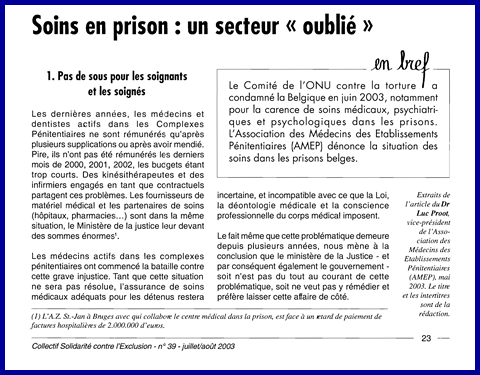 Dr.
Van Mol maintains an erudite confusion. The prisoners are neither
shackled, nor under monitoring when they have a surgery, but they
are shackled to prevent they escape. A prison warden is present
to ensure that the hospital staff can "to work without risk',
but he "does not step in the room during the quarter on an
hour of the surgery". "The room of hospital in which the
prisoner resides, is regarded as a prison cell". That thus
does not allow shackling any one. "The use of shackles is subjected
to a strict regulation and is always justified in an individual
decision. These decisions are consigned and can be consulted,"
according to the justice department. But in fact, the police services
decide of the measures to be taken during the transfers, according
to "how dangerous the prisoner is".
Dr.
Van Mol maintains an erudite confusion. The prisoners are neither
shackled, nor under monitoring when they have a surgery, but they
are shackled to prevent they escape. A prison warden is present
to ensure that the hospital staff can "to work without risk',
but he "does not step in the room during the quarter on an
hour of the surgery". "The room of hospital in which the
prisoner resides, is regarded as a prison cell". That thus
does not allow shackling any one. "The use of shackles is subjected
to a strict regulation and is always justified in an individual
decision. These decisions are consigned and can be consulted,"
according to the justice department. But in fact, the police services
decide of the measures to be taken during the transfers, according
to "how dangerous the prisoner is".
What could appear professional are only absurd contradictions. Anyone can do anything to a prisoner in so far as he or she wears a uniform, except the attending physicians who would not have anything to say. These doctors will all-the-same be able to authorise that Marcel be deprived of the right of visit of his friends at the time of his future hospitalizations, as if Dr Van Mol considered the presence of the prison warders medically justifiable, but not that of the people who give him the strength to survive.
The King was not yet invited to sign the voted laws, which must allow the Belgian courts application of the sentences [founded in 2007] to release the prisoners for health reasons. This charge thus remains to Dr. Van Mol, for 10.000 prisoners, an incarcerated population that has doubled when appeared how much savings the state could do, by the reduction of the health care to the bare minimum. Chaos reigns, for economic reasons, people say, but very different from what the State makes believe.
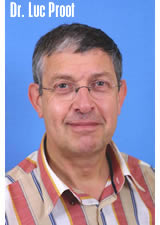 Each
prisoner is supposed to be covered by a medical insurance since
1994, but as it is the State that pays, Dr. Van Mol decides what
savings that can be made. In 2001, for example, a prisoner died
meningitis at the prison of St Gilles. It was a risk for the people
who had been in contact with him, according to Dr. Van Mol, but
it there was no reason to panic, he said. The wardens received antibiotics
for preventive measure, but not the prisoners. But even the doctors
and pharmacists must fight to obtain what returns to them, according
to Dr. Luc Proot. In 2003, the State owed 2 million euros to the
hospital St John of Bruges for the care to the prisoners.
Each
prisoner is supposed to be covered by a medical insurance since
1994, but as it is the State that pays, Dr. Van Mol decides what
savings that can be made. In 2001, for example, a prisoner died
meningitis at the prison of St Gilles. It was a risk for the people
who had been in contact with him, according to Dr. Van Mol, but
it there was no reason to panic, he said. The wardens received antibiotics
for preventive measure, but not the prisoners. But even the doctors
and pharmacists must fight to obtain what returns to them, according
to Dr. Luc Proot. In 2003, the State owed 2 million euros to the
hospital St John of Bruges for the care to the prisoners.
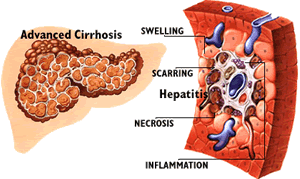 The
number of drug addicts in prison ensures more 20% of hepatitis C.,
for 1.2 % in the entire population. The treatment of this disease
easily costs 20.000 euros per patient, that is to say 200 million
euros for the entire incarceration population in Belgium. This amount
exceeds the total budget which the state allocates at the departments
of health in the prisons. Without treatment, hepatitis C. often
ends-up in cancer or cirrhosis of the liver. The prisoners are thus
sentenced to death, because the State deprives them of the allowances
of health care, yet granted to the people condemned and released
under condition, or allowed an electronic bracelet.
The
number of drug addicts in prison ensures more 20% of hepatitis C.,
for 1.2 % in the entire population. The treatment of this disease
easily costs 20.000 euros per patient, that is to say 200 million
euros for the entire incarceration population in Belgium. This amount
exceeds the total budget which the state allocates at the departments
of health in the prisons. Without treatment, hepatitis C. often
ends-up in cancer or cirrhosis of the liver. The prisoners are thus
sentenced to death, because the State deprives them of the allowances
of health care, yet granted to the people condemned and released
under condition, or allowed an electronic bracelet.
Another reason which encourages to limit the release on paroles and to build new prisons is that the loss of liberty deprives of minimum living wages and unemployment pay. It decreases the allowances for handicaps and the expenses of social security. The current shortage of electronic bracelet saves a million euros per month in Belgium, by depriving 1550 people of allowance to the electronic bracelets.
 As
the states' hygiene services cannot close prisons, 10.000 social
houses are much more expensive than 36 dilapidated prisons which
concentrate 10.000 prisoners. The State must pay toilets the prisoners
released on parole, but can impose them plastic buckets if they
stay in prison. The work which costs 9 euro an hour in the free
world is not paid from 0,76 to 1,44 euros of the hour in prison.
The little money left to the prisoners comes back to the State,
by prices without competition. A telephone call, for example, is
more expensive from a prison than from the Ritz, at approximately
one euro the minute, according it is given during the week or the
W/E.
As
the states' hygiene services cannot close prisons, 10.000 social
houses are much more expensive than 36 dilapidated prisons which
concentrate 10.000 prisoners. The State must pay toilets the prisoners
released on parole, but can impose them plastic buckets if they
stay in prison. The work which costs 9 euro an hour in the free
world is not paid from 0,76 to 1,44 euros of the hour in prison.
The little money left to the prisoners comes back to the State,
by prices without competition. A telephone call, for example, is
more expensive from a prison than from the Ritz, at approximately
one euro the minute, according it is given during the week or the
W/E.
Dr. Van Mol should define the quantity and the quality of food necessary to the keep the prisoners in good health. It occurred that by underfeeding them, the majority found the means of buying complements at three times the market price. Those who do not have the money are underfed. The question was denounced by the International Observatory of the Prisons. Nothing was done about it. The State gets ten times the benefit of the shops, because it does not pay neither rent, nor tax, and have no obligation to renovate its premises.
One has to see a prison infirmary to imagine the prison world. At Bruges, half dozen toothless men, with eyes haggard, face twisted by decalcification, move in slow motion, hanging to one another. It is their number, coming out of only one room, which makes realise that prison marks, as tattoos have marked the people who survived the concentration camps. They are not as skinny, but they are physically so ruined, that they have nothing in common with the prisoners that can be seen in the guest room. What crime could justifies that a State destroys human beings, in the name of a Ministry for Justice who denies to some, what the Ministry for health grants to the others?
| BELGIUM | Released under condition | Imprisoned |
| Health care | Unlimited | Minimum of survival |
| Hepatitis | 20.000 euros | A funeral |
| Access to pharmacy | Unlimited | Prohibited |
| Consumer | Protected | Not protected |
| Monopoly | Prohibited | Total |
| Lice treatment | Specialized shampoo | Shaven hair |
| Prevention of mushrooms | Hygiene service | Non covered |
| Average wages of the workers 2008 | 9 euros per hour | From 0,76 to1,44 euro per hour |
| Protection of the workers | Accessible trade union | Non covered |
| Social housing | Prisons | |
| Bedroom - Kitchen - Bathroom | Individual | Common |
| Minima | Toilets | Plastic bucket |
| Accessible windows (ventilation) | Obligatory | Free |
| Rénovation | Obligatory | Free and non existent |
Quelques sources:
- Bracelets électroniques
- Méningite à la prison de St Gilles
- Santé derrière les barreaux (2008)
- Prison, vecteur de redressement économique
Vidéo avec le Dr Van Mol: http://www.brusselnieuws.be/multimedia/video/060213_gevangenis

